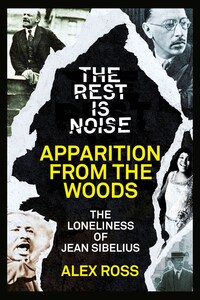This is a chapter from Alex Ross's groundbreaking history of 20th century classical music, The Rest is Noise.
It is released as a special stand-alone ebook to celebrate a year-long festival at the Southbank Centre, inspired by the book. The festival consists of a series of themed concerts. Read this chapter if you're attending concerts in the episode The rise of nationalism: rediscovering roots and folk culture.
Alex Ross, music critic for the New Yorker, is the recipient of numerous awards for his work, including an Arts and Letters Award from the American Academy of Arts and Letters, the Belmont Prize in Germany and a MacArthur Fellowship. The Rest is Noise was his first book and garnered huge critical acclaim and a number of awards, including the Guardian First Book Award and the National Book Critics Circle Award. He is also the author of Listen to This.
5 APPARITION FROM THE WOODS
The Loneliness of Jean Sibelius
Composing is a difficult business. “Desperately difficult,” says the devil in Doctor Faustus. It is a laborious traversal of an imaginary landscape. What emerges is an artwork in code, which other musicians must be persuaded to unravel. Unlike a novel or a painting, a score gives up its full meaning only when it is performed in front of an audience; it is a child of loneliness that lives off crowds. Nameless terrors creep into the limbo between composition and performance, during which the score sits mutely on the desk. Hans Pfitzner dramatized that moment of panic and doubt in Palestrina, his “musical legend” about the life of the Italian Renaissance composer. The character of Palestrina speaks for colleagues across the centuries when he stops his work to cry, “What is the point of all this? Ach, what is it for? What for?”
Jean Sibelius may have asked that question once too often. The crisis point of his career arrived in the late 1920s and the early ’30s, when he was being lionized as a new Beethoven in England and America and dismissed as a kitsch composer in the taste-making Austro-German music centers. The contrasts in the reception of his music matched the manic-depressive extremes of his personality—an alcoholic oscillation between grandiosity and self-loathing. Sometimes he believed that he was in direct communication with the Almighty—“For an instant God opens his door,” he wrote in a letter, “and His orchestra plays the Fifth Symphony”—and sometimes he felt worthless. In 1927, when he was sixty-one years old, he wrote in his diary, “Isolation and loneliness are driving me to despair ... In order to survive, I have to have alcohol ... Am abused, alone, and all my real friends are dead. My prestige here at present is rock-bottom. Impossible to work. If only there were a way out.”
Sibelius spent the last part of his life at Ainola, a rustic house outside Helsinki, Finland. On his desk for many years lay the Eighth Symphony, which promised to be his summary masterpiece. He had been working on it since 1924, and had indicated several times that it was almost ready for performance. A copyist transcribed twenty-three pages of the score, and at a later date Sibelius’s publisher may have bound the manuscript in a set of seven volumes. There were reportedly parts for chorus, as in Beethoven’s Ninth. But the Eighth never saw the light of day. The composer finally gave in to the seduction of despair. “I suppose one henceforth takes me as—yes!—a ‘fait accompli,’ ” he wrote in 1943. “Life is soon over. Others will come and surpass me in the eyes of the world. We are fated to die forgotten. I must start economizing. It can’t go on like this.”
Aino Sibelius, the composer’s wife, for whom the house was named, recalled what happened next: “In the 1940s there was a great auto da fé at Ainola. My husband collected a number of manuscripts in a laundry basket and burned them on the open fire in the dining room. Parts of the Karelia Suite were destroyed—I later saw remains of the pages which had been torn out—and many other things. I did not have the strength to be present and left the room. I therefore do not know what he threw on to the fire. But after this my husband became calmer and gradually lighter in mood.”
Ainola stands much as Sibelius left it. The atmosphere of the house is heavy and musty, as if the composer’s spirit were still pent up inside. But you get a different feeling when you walk into the forest that stretches out on one side of the house. The treetops meet in an endless curving canopy, tendrils of sunlight dangling down. The ground is uncluttered: many paths fork among the trunks. Venturing a little farther into the wood, you lose sight of all human habitation. A profound stillness descends. The light begins to fail, the mists roll in. After a while, you may begin to wonder if you will ever find your way back. Many times in Sibelius’s music the exaltation of natural sublimity gives way to inchoate fear, which has less to do with the outer landscape than with the inner one, the forest of the mind.














